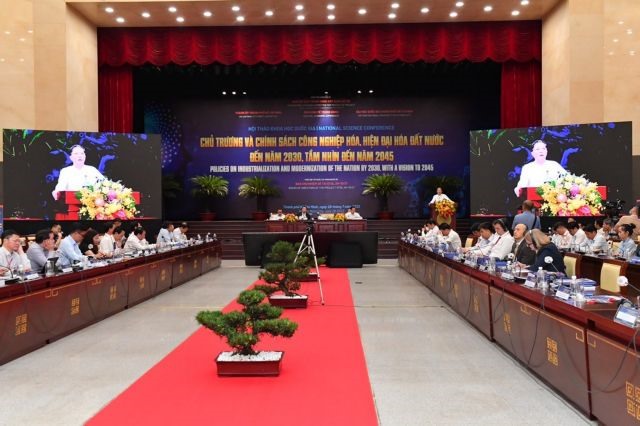 Society
Society

 |
The conference seeks to contribute to the development of the project called “Policies on industrialisation and modernisation of the nation by 2030, with a vision to 2045” . — VNS Photo Nguyễn Diệp
HCM CITY — Industrialisation and modernisation need to be based on science, technology and innovation associated with the requirements of high quality human resources, green growth, and sustainable and inclusive development, delegates said at a recent national science conference held in HCM City.
The Party Central Committee's Economic Commission co-chaired with the city Party Committee and Việt Nam National University HCM City (VNU-HCM) in coordination with the National Project Steering Committee to organise the conference.
The conference aimed to provide more scientific arguments, theoretical basis, international experience and proposals on guidelines, models and policies on industrialisation and modernisation of the country, contributing to the development of a project called “Policies on industrialisation and modernisation of the nation by 2030, with a vision to 2045.”
It attracted about 70 presentations and reports from more than 200 delegates, including managers, leading scientists and experts at ministries, departments and sectors at all levels, and international experts from the World Bank and the United Nations Industrial Development Organisation (UNIDO) in Việt Nam.
The delegates exchanged, discussed and presented new theoretical and practical problems arising from the process of industrialisation and modernisation of the country in general and the Southern Key Economic Zone in particular.
They also shared international experiences as well as made recommendations on policies, tasks and solutions to accelerate the process of industrialisation and modernisation in the new context.
The industrialisation and modernisation model of the country in the coming time must be adjusted and changed to have appropriate and flexible policies in adapting to the new situation, experts said.
According to Vũ Hải Quân, VNU-HCM's director, industrialisation and modernisation is an inevitable process, a key strategic and important task that determines the results of the implementation of the objectives of the country’s socio-economic development strategy, ensuring national defence and security.
Industry is an increasingly large contributor to the economy, promoting regional and industry linkages.
“However, this process has been slow. Many goals and targets have not been achieved,” he said.
To step up national industrialisation and modernisation, it needs to link with the development of the knowledge economy, natural resources and environmental protection, taking advantage of the opportunities of the Fourth Industrial Revolution.
“Education, science and technology must be placed at the highest priority if a country wants to augment its prosperity and development,” he said.
Prioritising developing education and promoting science, technology and innovation are the keys to achieving the goal of building a creative, democratic and rich country with national identity, he added.
Politburo member, head of the Party Central Committee's Economic Commission and head of the project Trần Tuấn Anh said: “We need to change our thinking about how to approach development models.”
Appropriate goals and directions must be set out, along with new and breakthrough tasks and solutions in accordance with the development requirements.
“We must focus on improving the quality of human resources, putting people at the centre and considering people as the subject and main resource of the process of industrialisation and modernisation of the country," he said.
Promoting education and training of high-quality human resources for priority industries, and new industries for each stage of the country’s growth are also needed.
He also pointed to the need to make close links between enterprises, employers, training institutions and the State to have human resources meeting the development requirements.
Besides that, Vietnamese enterprises should participate more deeply in the global value chain by promoting learning, improving and mastering technology, he said.
“We also need to pay special attention to effectively exploit the domestic market.”
The priority should be developing domestic industrial enterprises, and attracting high-quality FDI meeting the requirements of linking with domestic enterprises.
Most delegates also agreed national industrialisation and modernisation should put people at the centre, serving and bringing benefits to people.
The process of national industrialisation and modernisation needs to be closely linked with urbanisation, new-style rural area building, national digital transformation, an innovation-driven growth model and economic restructuring.
Building and completing specific mechanisms and policies to create conditions to promote science, technology, innovation, and the application and transfer of technology are absolutely necessary.
Promoting the entrepreneurship spirit, self-reliance, aspiration and great national unity are very important in the national industrialisation and modernisation process, they said.
The project will be completed for submission to the sixth Plenum of the 13th Party Central Committee in October. — VNS




